Independent Commission on the Constitutional Future of Wales: final report - Chapter 6: citizens’ views and alternative scenarios
Final report of the commission detailing options to strengthen Welsh democracy and deliver improvements for the people of Wales.
This file may not be fully accessible.
In this page
Introduction
The first part of this chapter explores the views that citizens expressed to us about the constitutional options for Wales. These reflect perceptions at a particular moment in time. The second part considers how these views might be affected by possible future changes in the governance of the UK.
Any substantial change to Wales’ status within the UK could affect the other parts of the state. In the same way, constitutional changes elsewhere in the UK would affect perceptions of the options for Wales. These developments would be beyond Wales’ control, though by planning ahead our citizens and politicians could engage constructively with the potential impact of these developments for Wales.
Part 1: citizens’ views of the constitutional options
The current devolution settlement
Our engagement and research revealed mixed levels of satisfaction with how Wales is run now, although some people found it difficult to comment because of their limited understanding of the subject.
On the citizens’ panels, some participants modified their views in response to information about what powers are devolved. Knowing the extent and the limitations of devolved powers, and where responsibility for delivery lay, affected their assessment. How devolved government is funded was often not understood by participants. Improved understanding appeared to hold the key to some participants’ opinions on what would be best for the future of Wales.
Views on the performance of the Welsh Government heavily influenced participants in the citizens’ panels. They found it difficult to separate these perceptions from opinions on the structures in place to run Wales. This was echoed in the online survey responses, where the perceived performance of the Welsh government and the UK government were often cited as reasons for seeking constitutional change. Even so, according to the qualitative research conducted by Beaufort Research, the principle that Wales should have its own governing institutions was largely supported, on the basis that a Welsh government would know Wales better and could make decisions in the national interest (Gathering public views on potential options for Wales’s constitutional future: Stage 1 Findings, Summary and Project Progress, Beaufort Research, 2023). Regardless of whether they were in favour of more devolution or less, participants expressed concern about the relationship between the Welsh Government and the UK government.
A sizeable minority of the self-selecting respondents to our online surveys were strongly opposed to devolution. The representative State of the Union research shows that generally there is support for the main principles of devolution, including in England, as we set out in more detail below.
Enhanced devolution
Across the different strands of the national conversation described in Chapter 2, enhanced devolution was seen as the lowest risk option for Wales. It would be an evolution of the current model, rather than radical change. This was not the view of those who wanted to see the end of devolution. For this group, enhancing devolution would embed the Welsh Government and Senedd further into the constitutional landscape.
Expanding the powers devolved to Wales
For Welsh citizens, greater powers for the devolved institutions within the Union is currently the most popular option, though support varies by age and political affiliation (see chapter 2). The research carried out for the Commission by Beaufort Research indicates that support for this option is less than it was 10 years ago, while support for independence and abolition of the Senedd has increased (Gathering public views on potential options for Wales’s constitutional future: Quantitative survey findings summary, Beaufort Research, 2023).
Constitutional preferences
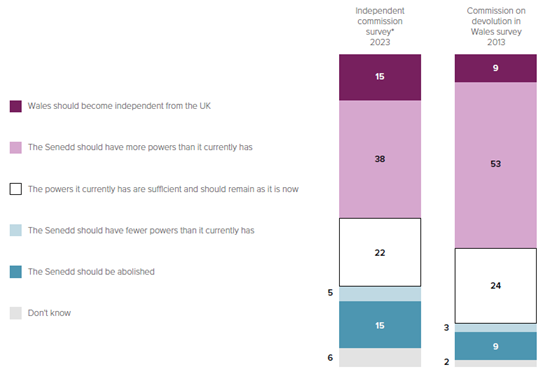
Question: At present, overall, which of these statements comes closest to your view about Wales?
- Wales should become independent from the UK
- The Senedd / Welsh Parliament should have more powers than it currently has
- The powers it currently has are sufficient and it should remain as it is now
- The Senedd / Welsh Parliament should have fewer powers than it currently has
- The Senedd / Welsh Parliament should be abolished
- Don't know
Graph taken from the 2023 Beaufort Research report (Gathering public views on potential options for Wales’s constitutional future: Quantitative survey findings summary, Beaufort Research, 2023)
There are a range of factors that might explain this change. In the past ten years more powers have been devolved in fields such as transport, energy and tax. Distinctive policy and legislation has made the role of the Welsh Government more apparent to citizens. The experience of the Covid pandemic highlighted how the powers of the Welsh Government and Senedd can affect people’s daily lives. A reduction in support for more powers to be devolved could be driven by people feeling that the current (expanded) scope of devolution is satisfactory, or it could be that people are dissatisfied with how these powers are being used, or both factors could be present. Further research would be needed to understand this.
Responses from Community Engagement Fund groups were generally in favour of more autonomy and expanded powers, as a means of bringing decision making closer to those who receive services. However, these reports generally showed a low level of understanding about the devolved powers and where decisions on public services were currently taken.
Protecting and strengthening devolution
Though people rarely used technical terms such as ‘the Sewel convention’ or ‘independent dispute procedures’ [Footnote 1] in their responses, there was generally strong and cross-party support for constitutional mechanisms to ensure that the powers of respective governments and Parliaments were respected (we explore the evidence for this in chapter 4, when we discuss citizens’ attitudes towards intergovernmental relations).
The State of the Union research indicated a plurality, and a majority of those with a view, across all parts of the UK in favour of a written constitution, which was replicated in the responses to our online surveys.
Dispute resolution
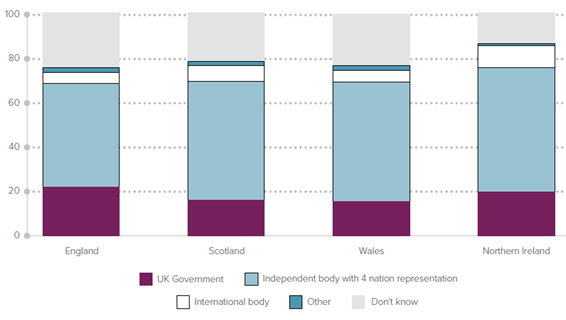
Question: When people talk about changing the way the UK is governed, this sometimes includes a body that can resolve disputes between levels of government. Thinking about possible arrangements for managing disputes between different levels of government in the UK who do you think should have the final say?
- The UK government
- An independent UK body with equal representation from England, Scotland Wales and NI
- An independent international body
- Something else
- Don't know
2023 State of the Union Survey report (Henderson, A., Wyn Jones, R., 2023, Public attitudes towards the constitutional future of the UK: Analysis from the 2023 State of the Union Survey, Wales Governance Centre and University of Edinburgh)
Written constitution
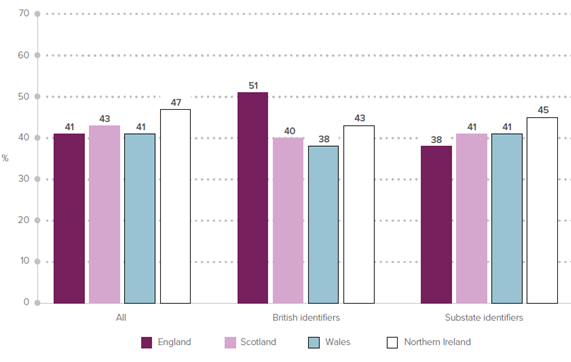
Question: When people talk about changing the way the UK is governed, this sometimes includes a written constitution that identifies the rights and responsibilities of citizens as well as the powers of different levels of government. To what extent, if at all, do you agree or disagree that this would improve the governance of the UK?
- Agree strongly
- Tend to agree
- Neither agree or disagree
- Tend to disagree
- Disagree strongly
- Don't know
Graph from the 2023 State of the Union report (Henderson, A., Wyn Jones, R., 2023, Public attitudes towards the constitutional future of the UK: Analysis from the 2023 State of the Union Survey, Wales Governance Centre and University of Edinburgh)
Abolition and referendums
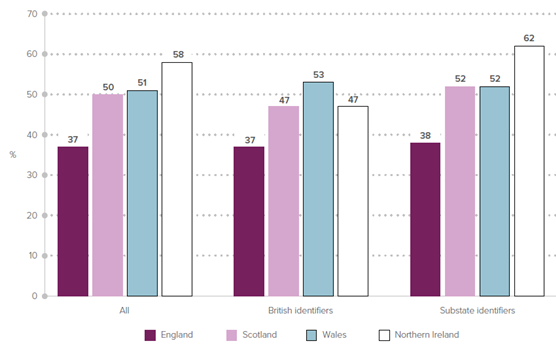
Question: Since the devolved legislatures in Scotland, Wales and Northern Ireland were established through referendums, the only way to get rid of them should be through another referendum.
- Strongly agree
- Tend to agree
- Neither agree or disagree
- Tend to disagree
- Strongly disagree
- Don't know
Graph shows percentage agreeing, by all and by national identity.
Graph from the 2023 State of the Union report (Henderson, A., Wyn Jones, R., 2023, Public attitudes towards the constitutional future of the UK: Analysis from the 2023 State of the Union Survey, Wales Governance Centre and University of Edinburgh).
Preference for a written constitution related to national identity but did not seem to relate to other constitutional preferences; many respondents saw a written constitution as a way to protect the powers of whichever government they saw as most important and to prevent overreach by the other one.
In all 4 parts of the UK, there was little support for a UK government blocking devolved governments from taking action within their powers, with a plurality (‘plurality’ has a specific meaning in relation to statistical analysis – the largest proportion, but not a majority) of respondents favouring intervention only when the devolved institutions were acting outside their powers (see chapter 4). A similar pattern emerged in respect of the UK Parliament and government’s powers to spend on devolved matters, with fewer than a fifth of respondents in England, Scotland and Wales believing that the UK government should be able to spend in devolved areas whenever they want (Henderson, A., Wyn Jones, R., 2023, Public attitudes towards the constitutional future of the UK: Analysis from the 2023 State of the Union Survey, Wales Governance Centre and University of Edinburgh). This suggests that most people want to see a system in which all governments respect the established parameters and conventions governing their actions.
Finally, there was support for the notion that devolution should not be ended unilaterally by the UK Parliament. A plurality of respondents across all 4 territories agreed that devolved institutions should only be abolished after a referendum according to the State of the Union research, though there was a high proportion of ‘don’t knows’ in England.
Wales in a federal UK
This option attracted some strong supporters but was generally the least attractive option for citizens across all the strands of our engagement. For many it was seen as neither one thing nor another, and too complicated and expensive. The structure of the UK was often seen as a barrier, particularly the risk of domination by England due to its population size in relation to the other nations.
For the citizens’ panels, this was a model that found favour in the first stage but became much less popular in the third stage after people had time to think through its possible implications (see chapter 2).
The wide range of federal models available
The variety of potential federal models that could be adopted by the UK might also have been a factor in people’s responses; they may have felt uncertain about the potential implications as there were so many variables to consider. We received complaints through the online engagement platform that the federal questions could not be answered as there were so many models available.
It is notable that no consensus emerged in our online surveys on how a federal UK might work, or even that it could work. Respondents had widely different ideas for how powers could be split in a federal model: at one extreme some believed that only defence and/or foreign policy should be a federal matter; at the other some respondents believed that sub-state nations’ responsibilities should be limited to one or two policy areas such as health, or local government.
Should federalisation become a concrete prospect for the UK it is likely that there would be more clarity about proposals and their implications, but at present it seems an unfamiliar concept to citizens.
Attitudes to the Union, national governance, and the implications for a federal UK
Some commentators have argued that a federal UK would allow the Union to continue while giving the nations more autonomy. Citizens’ views of the Union are an important factor when considering the viability of federalisation as an option for the UK.
Our research indicates that, across the UK, many people seem unconcerned about a significant change to the composition of the Union. While they may have strong views about the position of their own part of the UK, overall people do not feel strongly about changes to the status of other parts. On average, citizens in all parts favour Irish reunification, and thus the exit of Northern Ireland from the Union, with Scots most in favour and respondents in Northern Ireland just above the midpoint of the scale. On Scottish independence, opinion in Scotland and in Northern Ireland is also finely balanced.
Constitutional change across the UK
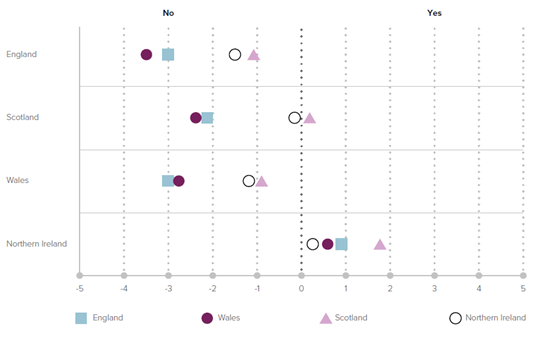
Question: On a scale of -10 to +10, where -10 is Definitely No and +10 is Definitely Yes, do you think that [x] should become an independent country.
Graph from the 2023 State of the Union report (Henderson, A., Wyn Jones, R., (2023), Public attitudes towards the constitutional future of the UK: Analysis from the 2023 State of the Union Survey, Wales Governance Centre and University of Edinburgh)
From this research it appears that, across the UK, people are most interested in their own nation’s relationship with the UK. A federal UK would require a 4 nations perspective, and all nations to change their relationship with each other. Achieving this requires people across the UK to develop a different conception of what the Union is, and their nation’s place within it.
At present, public opinion is not heading in that direction. It also indicates that citizens may not view a federation as necessary to preserve the Union if their conception of the Union does not rely on maintaining its present composition.
The State of the Union research indicates that citizens are not enthusiastic about the changes to English governance that would be required to establish a federal UK. This research found low levels of support for the idea of England being governed by an English Parliament, and even lower levels of support for regional governance arrangements.
Governance of England
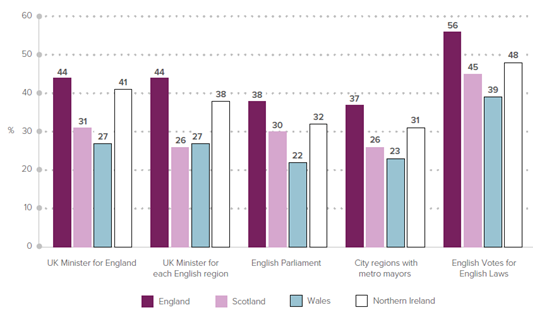
Question: In the past 5 years the following ideas for changes to how England is governed have been proposed. Please indicate to what extent, if at all, you agree or disagree with each idea (strongly agree, tend to agree neither agree nor disagree, tend to disagree, strongly disagree, don't know):
- A UK government minister for England
- UK government ministers for each of the regions of England
- An English parliament
- Regional authorities based around the major cities in England (sometimes called city-regions led by metro mayors)
- Changing the rules in the UK parliament so that only English MPS can vote on laws that would apply only in England (sometimes called English votes for English laws)
Graph from State of the Union 2023 report (Henderson, A., Wyn Jones, R., (2023), Public attitudes towards the constitutional future of the UK: Analysis from the 2023 State of the Union Survey, Wales Governance Centre and University of Edinburgh)
The relative size of England compared to the other countries of the UK is a factor in how a federal UK might function, and so attitudes to the governance of England as one sub-state or as several smaller regions have a bearing on the possibility of a federation in the future. Citizens throughout the UK tend to favour the option of England remaining as a single unit in terms of governance.
Regional governance in England
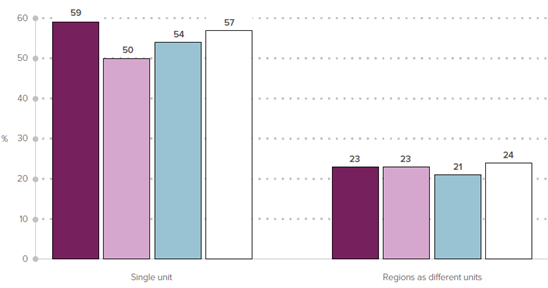
Question: Thinking about possible arrangements for making laws for England, 2 options are often mentioned. If you had to choose, which ONE would you prefer?
- For the whole of England to be treated as a single unit
- For each English region to be treated as a different unit
- Other
- Don't know
Graph from the 2023 State of the Union (Henderson, A., Wyn Jones, R., (2023), Public attitudes towards the constitutional future of the UK: Analysis from the 2023 State of the Union Survey, Wales Governance Centre and University of Edinburgh).
Independence
Independence was the option that online survey respondents were most comfortable discussing, based on the relative willingness to expand on their viewpoints in their written answers. They seemed more familiar with the concept and implications of independence than those of federalism or enhanced devolution. This included respondents who opposed independence as well as those who supported it.
In the Beaufort Research quantitative survey, when asked what sort of constitutional changes respondents would want to see only 6% identified independence unprompted (Gathering public views on potential options for Wales’s constitutional future: Quantitative survey findings summary, Beaufort Research, 2023). However, when prompted, there is a different picture – particularly among the young.
Constitutional preferences by age
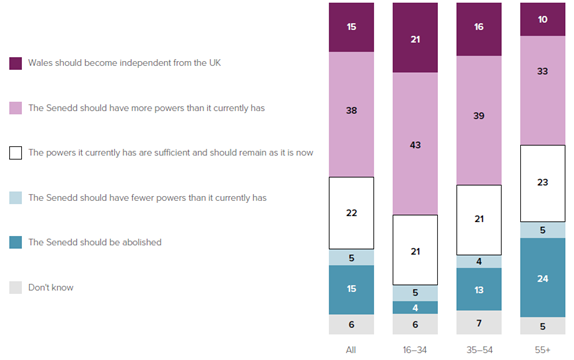
Question: At present, which of these statements comes closest to your views about Wales?
- Wales should become independent from the UK
- The Senedd / Welsh Parliament should have more powers than it currently has
- The powers it currently has are sufficient and it should remain as it is now
- The Senedd / Welsh Parliament should have fewer powers than it currently has
- The Senedd / Welsh Parliament should be abolished
- Don't know
Graph from the 2023 State of the Union (Gathering public views on potential options for Wales’s constitutional future: Quantitative survey findings summary, Beaufort Research, 2023)
The possibility of leaving the UK is a polarising issue, as demonstrated in the graphs below. In Scotland and Northern Ireland views on whether to remain in the UK or become independent/ reunified with Ireland are strongly held at either end of the spectrum. In England and Wales, many respondents do not have a such a pronounced preference either way. On aggregate, Welsh respondents are more sceptical about independence for Wales than respondents in any other part of the UK about their nation leaving the UK.
Constitutional reform across the UK
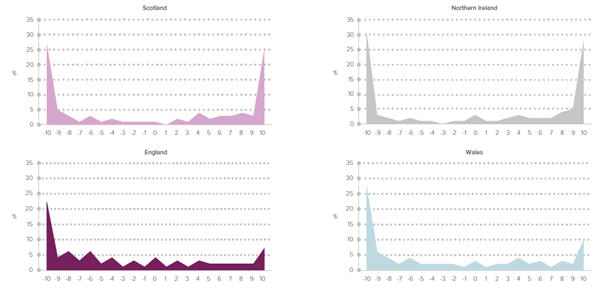
Distribution of support for independence/reunification in own territory. Questions: Scotland - On a scale of -10 to +10, where -10 is Definitely No’ and +10 is ‘Definitely Yes’, do you think that Scotland should become an independent country? Northern Ireland – And using a slightly different scale what about Northern Ireland? If -10 Is Definitely remain in a union with the United Kingdom and +10 is Definitely should become part of a united Ireland, what do you think should happen in Northern Ireland? England – And using the same scale, what about England? Do you think that England should become an independent country? Wales – And using the same scale, what about Wales? Do you think that Wales should become an independent country.
Graph from the 2023 State of the Union research (Henderson, A., Wyn Jones, R., 2023, Public attitudes towards the constitutional future of the UK: Analysis from the 2023 State of the Union Survey, Wales Governance Centre and University of Edinburgh).
Attitudes in Wales towards independence
The online survey responses provide some insight into the motivations of those who support independence. The Dweud eich Dweud: Have your Say responses revealed that support for independence was often driven by attitudes towards the UK government and grievances (historic and current) about how Wales has fared within the UK. Very few responses in favour of independence expressed a different motivation. This survey was open during a period of particular instability in the UK government with 3 Prime Ministers in a 6-week period, and a mini-budget with a large-scale economic fall-out. This may have influenced support for independence at that time.
The online engagement platform survey responses, which contained detailed questions about the practicalities of independence, indicated that many respondents who support independence had not considered these matters in depth. When asked about, for example borders, currency, or future relations with England/ the rest of the UK, supporters of independence often gave vague answers, along the lines of ‘same way other similar sized countries manage’, and ‘lots of other places do well in this situation’. Some drew on international examples, such as the experience of Ireland, of former UK colonies, of the separation of Czechoslovakia, or of former USSR countries such as Estonia, without considering whether these were comparable to the Welsh context.
Supporters of independence held a positive view of the fiscal position of an independent Wales, with some believing that independence would automatically improve Wales’ finances – either because they believe that Wales contributes more to UK taxes than it receives in public spending (this is factually incorrect; Wales raises less in taxes than it receives in public funding), or because Wales would no longer have to contribute to funding the UK defence forces or large UK infrastructure projects. There were some who thought that taxes and government borrowing would rise but were content with this as life in Wales would improve overall.
Responses that opposed independence cited practical considerations such as borders, currency and public finances. They took the view that there would be higher taxes, high government borrowing and reduced public service provision, and were unwilling to accept these consequences in return for greater sovereignty. Others argued that independence would be ‘an economic disaster’.
Opposition to devolution
As set out in the interim report, the abolition of the Senedd was not one of the options we took forward for analysis in this report. We received a number of responses to our online engagement calling for the end of devolution, these gave us an insight into their perceptions and concerns (in 'Dweud eich Dweud: Have your Say' 20% of responses indicated a preference for unwinding devolution. In the online engagement platform survey, which asked specific questions about aspects of constitutional change rather than general constitutional preferences, responses that favoured an end to devolution ranged from 2% of responses to 29% of responses by question).
These responses showed that advocacy for abolition of the devolved institutions is often grounded in disagreement with the decisions of the current Welsh Government. Specific policies were cited in several responses, most often votes at 16, second homes policies, promotion of the Welsh language, and 20mph speed limits, as well as more general negative perceptions of competence in public services particularly health, education, and transport infrastructure.
Some expressed support for abolition of the devolved institutions as they perceive that the Welsh Government is not interested in their local area. Some held this view because their preferred political party has never been represented in government in Wales. Others expressed positive support for the Union and a belief that devolution undermines it, but many more cite the actions of the (Welsh) government in power as a reason to reject the devolved system of government.
Wales seems to be unusual in that citizens who are dissatisfied with the actions of their government and parliament respond by calling for their abolition. We have not seen evidence to suggest that that this is the case in other parts of the UK.
We have not received a reasoned proposal for reversing devolution and how it would be achieved, as opposed to criticism of the current workings of devolution. Those that did express a view often suggested returning to the position in the 1990s when Wales was governed by the UK government, without considering the practicalities of doing so in the context of 25 years of devolution to nations, and the direction set by the UK government to delegate more powers to the regions of England.
We received little evidence on what might replace devolution, either from our engagement with citizens or from political/ expert advocates. We made attempts to engage with Reform UK, they did not respond to our invitations to give evidence. As a result, self-selecting online survey responses were our main source of evidence on support for unwinding devolution.
Part 2: The impact of major constitutional changes in the wider UK - alternative scenarios
In this section we explore the impact that changes in the composition of the UK might have on attitudes towards constitutional change in Wales. The analysis below reflects our consideration of the advice of our Expert Panel on the impact of the scenarios discussed.
Major constitutional change in Scotland or Northern Ireland
The Scottish Government is committed to seeking a further referendum on independence. For Northern Ireland, the procedure for holding a referendum on reunification with Ireland is set out in statute. While neither of these scenarios appear to be imminent, there is a realistic prospect that either or both may occur in the future.
Reunification of the island of Ireland
On balance, this development would have a relatively modest impact on the constitutional position of Wales. The geography and history of Northern Ireland means that reunification would have a limited impact on the constitutional debate in Wales.
The process reunification would follow would not be applicable to Wales. Northern Ireland would not become an independent nation, with a land border to a larger country. It would leave to become part of Ireland, and the border with Great Britain would be the Irish Sea. So, if this took place, the debate and negotiations on exiting the Union would have few parallels with what would be expected for Wales in the event of constitutional change.
In theory it is possible that Irish reunification could lead to Great Britain reconsidering its constitution along more federal lines. That would depend on the extent to which Scotland saw its future within the UK, and the willingness of England to change its governance structures.
If Northern Ireland were to leave the Union, Great Britain would no longer share a land border with another country, which could open the way to a UK government pursuing greater divergence from the EU. This could create difficulties in establishing a relationship with the EU for an independent Wales, whether it sought to join the EU itself or not.
An independent Scotland
Many commentators see an independent Scotland as a necessary first step in a journey to independence for Wales. There is no practical reason why Wales could not leave while Scotland remained part of the Union, but the trajectory towards independence in Scotland has greater momentum and public support. Therefore, it seems likely that Scottish independence would occur ahead of a mandate for Welsh independence.
Unlike Irish reunification, there is no legal process in place for Scotland to leave the UK. It is possible that the process followed by Brexit - a referendum vote in favour of exit followed by a period of negotiation to agree the practical implications of departure – could provide a broad precedent. However, the Brexit process was established to achieve a different aim to that of Scottish independence, and so there is a limit to how far this precedent could be applied. A negotiation would be between Scotland and the government of the rest of the UK. It is possible that the UK government may see this as a bilateral negotiation, without the involvement of the Welsh or Northern Irish governments, or they may seek to involve the devolved governments in the process.
Whatever process was followed towards Scottish independence, it is likely that this would be seen as a template for Wales, which could affect public opinion on independence within Wales. A confrontational process which worked to the detriment of Scotland might work against the case for independence in Wales. At the same time, the existence of a path to independence, even a rocky one, could create greater certainty which may be encouraging to supporters of independence.
If Wales were the only devolved nation in the UK
Devolution did not lead to significant changes in the way the UK government and Parliament operate in governing the UK. Even change as significant as the departure of one or two countries might not automatically lead to an immediate and fundamental change to the constitution of the UK.
In practice, it seems likely that the departure of both Scotland and Northern Ireland from the UK would affect the operation and viability of Welsh devolution. This would partly depend on how the UK government and English voters viewed Wales in that situation, and how the people of Wales saw their country and devolved institutions.
Wales held the status of a country within the UK for generations before devolution. It is hard to predict how many people in Wales or England would see the existence of a devolved government as central to the concept of ‘Wales: the nation’ in this scenario.
There is a risk that in a UK of 2 nations, one of 3 million and one of 56 million, people might question the practicality of continued devolution. For cross-border matters such as transport or economic development, devolution might seem more of a complication than a benefit when there is only one border involved. If this became the majority view, then some might argue that legislative devolution was no longer viable for Wales and that the regional devolution models of England should apply instead.
Alternatively, a future UK government might see furthering or protecting devolution to Wales as a bulwark against the last devolved nation seeking independence. It is also possible that in a union of 2 nations, regions of England such as Cornwall, London, Greater Manchester and others, might advocate for their own legislative powers. Without the northern pull of Scotland and Northern Ireland, the UK economy could become even more centralised and weighted towards the southeast of England. Regional devolution, including legislative devolution, might be seen as a counter to that tendency. In that scenario, there could be more popular support for devolution as a governance model for Wales and England.
Should Wales choose to remain in a union with England, following the secession of Scotland and Northern Ireland, it is unlikely that its current constitutional framework could continue unamended in the medium to long term.
In that scenario, it would be vital for Welsh citizens and elected representatives to be actively engaged in discussions about the implications of potential changes to their country’s governance.
UK government with significant programme of constitutional reform
In this scenario, Wales would be a small part of a UK-wide reform programme. The government of Wales would need clear objectives and proposals in order to influence this programme.
There is a risk that major UK-level constitutional reforms would not leave space for Welsh constitutional reform. A reformed second chamber or changes to representation in the House of Commons might later change the electoral and political maths in a way that facilitated reforms of Welsh governance, but that might not be a priority for the UK government.
Further undermining of the devolution settlement
We have noted that support in Wales for abolition of the Senedd has risen to 15% from around 9% a decade ago (Gathering public views on potential options for Wales’s constitutional future: Quantitative survey findings summary, Beaufort Research, 2023). There is limited support for devolution to the regions of England, though this seems to be driven by lack of interest rather than hostility. However, there is solid support for the idea that UK and devolved governments should have their authority respected, and act within their boundaries.
Any immediate attempt to abolish the Welsh governance structure would probably be met with popular opposition, but slow erosion could go unnoticed until it was too late to remedy.
Some argue that the Internal Market Act 2020 is in effect already substantially undermining the settlement. The UK Ministerial funding powers are so broad that they could be used to undermine the delivery of core devolved functions such as education, health, transport, local government and housing. The consequential reductions in funding through the Barnett formula could effectively starve the Welsh Government of resources. In the light of declining services and the unpopular policy choices required to balance reducing budgets, calls for an alternative to devolution could become louder.
Changes in relationships with the EU
The nature of the UK’s relationship with the EU will impact on the viability and attractiveness of constitutional change for Wales.
A future UK government might choose to build closer ties to the EU or the EEA, rejoin the customs union or even rejoin the Single Market. Becoming part of a shared regulatory framework would address some of the current difficulties of the devolution settlement, and would provide a shared point of reference for the structure of a federation or for independence negotiations.
The evolution of the EU could affect the appeal of constitutional change for Welsh citizens. Nations such as Ukraine joining the EU would change its centre of gravity. How the four freedoms are embedded into EU law and how the integrity of the external borders are protected will have significant impacts on whether Wales would benefit from EU membership, and whether it would be attractive to citizens in Wales as either part of the UK or as an independent nation.
Conclusions
Our consideration of the results of our engagement and research and analysis of potential scenarios makes clear that constitutional change for Wales cannot be thought of in isolation from the rest of the UK. Change elsewhere will affect the viability and attractiveness of the options for Wales. The impact of the possible scenarios discussed above depends on public opinion in Wales and the other parts of the UK.
It is vital that Welsh citizens and political leaders engage in the debate about constitutional change in the UK, as the direct and indirect impacts of those changes could have significant implications for Wales. This will ensure that the people of Wales can respond positively to changing constitutional realities, rather than scramble to respond to changes triggered by external events.
Footnotes
- As set out in chapter 3, the Sewel Convention is a non-binding Parliamentary agreement that UK Parliament does not normally make legislation in a devolved area without the consent of the devolved legislature. An independent dispute procedure would be, for example, a process to refer Treasury funding decisions in relation to devolved governments to an independent body to reach a verdict. (Back to text)
